# click the upper-left icon to select videos from the playlist
source: Simons Institute 2017年3月27日
This workshop will focus on dramatic advances in representation and learning taking place in natural language processing, speech and vision. For instance, deep learning can be thought of as a method that combines the tasks of finding a classifier (which we can think of as the top layer of the deep net) with the task of learning a representation (namely, the representation computed at the last-but-one layer).
Developing a theory for such empirical work is an exciting quest, especially since the empirical work draws upon non-convex optimization. The workshop will draw a mix of theorists and practitioners, and the following is a list of sample issues that will be discussed: (a) Which models for representation make more sense than others, and why? (In other words, what patterns in data are they capturing, and how are those patterns useful?) (b) What is an analog of generalization theory for representation learning? Can it lead to a theory of transfer learning to new distributions of inputs? (c) How can we design algorithms for representation learning with provable guarantees? What progress has already been made, and what lessons can we draw from it? (d) How can we learn representations that combine probabilities and logic?
For more information, please visit https://simons.berkeley.edu/workshops/machinelearning2017-2
These presentations were supported in part by an award from the Simons Foundation.
Geometry, Optimization and Generalization in Multilayer Networks 49:19 Nathan Srebro, TTI Chicago. Foundations of Machine Learning
A Non-generative Framework and Convex Relaxations for Unsupervised Learning 36:01
Representations for Language: From Word Embeddings to Sentence Meanings 1:14:06
The Missing Signal 59:31
Representations of Relationships in Images and Text 42:54
Spotlight Talk: A Formalization of Representation Learning 17:44
Spotlight Talk: Semi-Random Units for Learning Neural Networks with Guarantees 18:30
Unsupervised Discovery Through Adversarial Self-Play 41:44
Learning from Unlabeled Video 44:54
Deep Reinforcement Learning 1:11:34
Supersizing Self-Supervision: Learning Perception and Action without Human Supervision 40:42
Failures of Deep Learning 45:44
Continuous State Machines and Grammars for Linguistic Structure Prediction 38:00
Adversarial Perceptual Representation Learning Across Diverse Modalities and Domains 46:57
Evaluating Neural Network Representations Against Human Cognition 1:04:15
Representation Learning for Reading Comprehension 45:01
Tractable Learning in Structured Probability Spaces 40:09
Spotlight Talk: Convolutional Dictionary Learning through Tensor Factorization 22:47
Spotlight Talk: How to Escape Saddle Points Efficiently 16:19
Re-Thinking Representational Learning in Robotics and Music 41:54
Representation Learning of Grounded Language and Knowledge: with and without End-to-End Learning 42:44
Unsupervised Representation Learning 1:09:16
Generalization and Equilibrium in Generative Adversarial Nets (GANs) 43:28
Provably Learning of Noisy-or Networks 41:32
Learning Paraphrastic Representations of Natural Language Sentences 39:44
Formation and Association of Symbolic Memories in the Brain 43:17
Learning Representations for Active Vision 1:06:38
Resilient Representation and Provable Generalization 42:18
Word Representation Learning without unk Assumptions 47:18
Spotlght Talk: Performance Guarantees for Transferring Representations 20:15
1. Clicking ▼&► to (un)fold the tree menu may facilitate locating what you want to find. 2. Videos embedded here do not necessarily represent my viewpoints or preferences. 3. This is just one of my several websites. Please click the category-tags below these two lines to go to each independent website.
2017-05-18
Interactive Learning
# click the upper-left icon to select videos from the playlist
source: Simons Institute 2017年2月13日
Interactive learning is a modern machine learning paradigm of significant practical and theoretical interest, where the algorithm and the domain expert engage in a two-way dialog to facilitate more accurate learning from less data compared to the classical approach of passively observing labeled data. This workshop will explore several topics related to interactive learning broadly defined, including active learning, in which the learner chooses which examples it wants labeled; explanation-based learning, in which the human doesn't merely tell the machine whether its predictions are right or wrong, but provides reasons in a form that is meaningful to both parties; crowdsourcing, in which labels and other information are solicited from a gallery of amateurs; teaching and learning from demonstrations, in which a party that knows the concept being learned provides helpful examples or demonstrations; and connections and applications to recommender systems, automated tutoring and robotics. Key questions we will explore include what are the right learning models in each case, what are the demands on the learner and the human interlocutor, and what kinds of concepts and other structures can be learned. A main goal of the workshop is to foster connections between theory/algorithms and practice/applications. For more information, please visit https://simons.berkeley.edu/workshops/machinelearning2017-1
These presentations were supported in part by an award from the Simons Foundation.
Machine Learning from Verbal User Instruction 1:05:29 Tom Mitchell, Carnegie Mellon University
Machine Teaching in Interactive Learning 1:04:53
Interactively Learning Robot Objective Functions 48:05
Words, Pictures, and Common Sense 48:26
Stochastic Variance Reduction Methods for Policy Evaluation 47:16
Interactive Clustering 45:26
Crowdsourcing and Machine Learning 44:33
Active Learning Beyond Label Feedback 47:33
Active Learning for Multidimensional Experimental Spaces of Biological Responses 44:56
Interactive Language Learning from the Extremes 1:04:43
Robot Learning from Motor-Impaired Teachers and Task Partners 55:29
Sample-Efficient Reinforcement Learning with Rich Observations 58:48
Robots Learning from Human Interactions 45:00
Robot Learning, Interaction and Reliable Autonomy 52:59
Interactive Learning of Parsers from Weak Supervision 1:11:57
Power of Active Sampling for Unsupervised Learning 51:35
Leveraging Union of Subspace Structure to Improve Constrained Clustering 1:00:42
Hierarchical Learning for Human-Robot Collaboration 43:39
Active Nearest-Neighbor Learning in Metric Spaces 49:37
Systems Presentation 58:44
TicToc: A General Technique for Near-Optimal Active Learning with Noise 53:59
Interactive Learning of Mixtures of Submodular Functions 1:03:53
source: Simons Institute 2017年2月13日
Interactive learning is a modern machine learning paradigm of significant practical and theoretical interest, where the algorithm and the domain expert engage in a two-way dialog to facilitate more accurate learning from less data compared to the classical approach of passively observing labeled data. This workshop will explore several topics related to interactive learning broadly defined, including active learning, in which the learner chooses which examples it wants labeled; explanation-based learning, in which the human doesn't merely tell the machine whether its predictions are right or wrong, but provides reasons in a form that is meaningful to both parties; crowdsourcing, in which labels and other information are solicited from a gallery of amateurs; teaching and learning from demonstrations, in which a party that knows the concept being learned provides helpful examples or demonstrations; and connections and applications to recommender systems, automated tutoring and robotics. Key questions we will explore include what are the right learning models in each case, what are the demands on the learner and the human interlocutor, and what kinds of concepts and other structures can be learned. A main goal of the workshop is to foster connections between theory/algorithms and practice/applications. For more information, please visit https://simons.berkeley.edu/workshops/machinelearning2017-1
These presentations were supported in part by an award from the Simons Foundation.
Machine Learning from Verbal User Instruction 1:05:29 Tom Mitchell, Carnegie Mellon University
Machine Teaching in Interactive Learning 1:04:53
Interactively Learning Robot Objective Functions 48:05
Words, Pictures, and Common Sense 48:26
Stochastic Variance Reduction Methods for Policy Evaluation 47:16
Interactive Clustering 45:26
Crowdsourcing and Machine Learning 44:33
Active Learning Beyond Label Feedback 47:33
Active Learning for Multidimensional Experimental Spaces of Biological Responses 44:56
Interactive Language Learning from the Extremes 1:04:43
Robot Learning from Motor-Impaired Teachers and Task Partners 55:29
Sample-Efficient Reinforcement Learning with Rich Observations 58:48
Robots Learning from Human Interactions 45:00
Robot Learning, Interaction and Reliable Autonomy 52:59
Interactive Learning of Parsers from Weak Supervision 1:11:57
Power of Active Sampling for Unsupervised Learning 51:35
Leveraging Union of Subspace Structure to Improve Constrained Clustering 1:00:42
Hierarchical Learning for Human-Robot Collaboration 43:39
Active Nearest-Neighbor Learning in Metric Spaces 49:37
Systems Presentation 58:44
TicToc: A General Technique for Near-Optimal Active Learning with Noise 53:59
Interactive Learning of Mixtures of Submodular Functions 1:03:53
Proving and Using Pseudorandomness
# click the upper-left icon to select videos from the playlist
source: Simons Institute 2017年3月6日
One theme of this workshop will be how to leverage weak pseudorandomness properties, fooling simple classes of tests, in order to derive stronger pseudorandomness properties related to more complex tests. In the setting of additive combinatorics, what is the minimal set of tests that primes have to satisfy in order to guarantee that they contain arithmetic progressions (or other structures)? For example, recent work of Conlon, Fox and Zhao shows that a “correlation condition” initially imposed in the work of Green and Tao is not necessary.
In complexity theory, most unconditional constructions of pseudorandom generators ultimately all rely on various combinations of four basic tools: k-wise independence, small-bias distributions, error-correcting codes, and random walks in expanders. The technical core of the analysis of known pseudorandom generators is to show that pseudorandomness against simple tests implies pseudorandomness against more complex tests (see for example Braverman’s theorem). Explicit constructions of pseudorandom objects have been essential to derandomize algorithms such as primality testing and undirected connectivity, and they have been applied in cryptography, distributed systems, complexity theory, streaming algorithms and learning theory. This workshop will explore unconditional constructions of pseudorandom objects at the frontier of progress, such as pseudorandom generators for small-space computations, small-depth circuits with modular gates, threshold circuits and DNFs. For more information, please visit: https://simons.berkeley.edu/workshops/pseudorandomness2017-2
These presentations were supported in part by an award from the Simons Foundation.
The Uncanny Usefulness of Constructive Proofs of Pseudorandomness 34:00 Valentine Kabanets, Simon Fraser University
Approximately Counting Solutions to Systems of Quadratic Equations 30:39
Pseudorandomness in Data Structures 1:00:42
Packing Degenerate Graphs Using Pseudorandomness 1:00:35
Regularity Inheritance in Pseudorandom Graphs 31:43
The Number of B_h-sets of a Given Cardinality 36:27
Removal Lemmas with Polynomial Bounds 57:05
Forcing Quasirandomness with Triangles 1:01:25
Explicit, Almost Optimal, Epsilon-Balanced Codes 1:04:49
Preserving Randomness for Adaptive Adversaries 1:00:26
Mixing Implies Lower Bounds for Space Bounded Learning 49:46
Algorithmic Regularity Lemmas and Applications 30:54
Linear-Algebraic Pseudorandomness: Subspace Designs and Dimension Expanders 59:55
Derandomizing "Algebraic RL" 59:44
Deterministic Isolation for Bipartite Matching and Matroid Intersection 32:57
PRGs for Small Space via Fourier Analysis 33:34
 [private video]
[private video]
Pseudorandom Generators from Pseudorandom Multi-Switching Lemmas 34:35
Query-to-Communication Lifting for BPP 28:40
Fast Permutation Property Testing and Metrics of Permutations 49:14
Randomness Intuition 1:03:53
A Reduction from Efficient Non-Malleable Extractors to Low-Error Two-Source Extractors 50:20
source: Simons Institute 2017年3月6日
One theme of this workshop will be how to leverage weak pseudorandomness properties, fooling simple classes of tests, in order to derive stronger pseudorandomness properties related to more complex tests. In the setting of additive combinatorics, what is the minimal set of tests that primes have to satisfy in order to guarantee that they contain arithmetic progressions (or other structures)? For example, recent work of Conlon, Fox and Zhao shows that a “correlation condition” initially imposed in the work of Green and Tao is not necessary.
In complexity theory, most unconditional constructions of pseudorandom generators ultimately all rely on various combinations of four basic tools: k-wise independence, small-bias distributions, error-correcting codes, and random walks in expanders. The technical core of the analysis of known pseudorandom generators is to show that pseudorandomness against simple tests implies pseudorandomness against more complex tests (see for example Braverman’s theorem). Explicit constructions of pseudorandom objects have been essential to derandomize algorithms such as primality testing and undirected connectivity, and they have been applied in cryptography, distributed systems, complexity theory, streaming algorithms and learning theory. This workshop will explore unconditional constructions of pseudorandom objects at the frontier of progress, such as pseudorandom generators for small-space computations, small-depth circuits with modular gates, threshold circuits and DNFs. For more information, please visit: https://simons.berkeley.edu/workshops/pseudorandomness2017-2
These presentations were supported in part by an award from the Simons Foundation.
The Uncanny Usefulness of Constructive Proofs of Pseudorandomness 34:00 Valentine Kabanets, Simon Fraser University
Approximately Counting Solutions to Systems of Quadratic Equations 30:39
Pseudorandomness in Data Structures 1:00:42
Packing Degenerate Graphs Using Pseudorandomness 1:00:35
Regularity Inheritance in Pseudorandom Graphs 31:43
The Number of B_h-sets of a Given Cardinality 36:27
Removal Lemmas with Polynomial Bounds 57:05
Forcing Quasirandomness with Triangles 1:01:25
Explicit, Almost Optimal, Epsilon-Balanced Codes 1:04:49
Preserving Randomness for Adaptive Adversaries 1:00:26
Mixing Implies Lower Bounds for Space Bounded Learning 49:46
Algorithmic Regularity Lemmas and Applications 30:54
Linear-Algebraic Pseudorandomness: Subspace Designs and Dimension Expanders 59:55
Derandomizing "Algebraic RL" 59:44
Deterministic Isolation for Bipartite Matching and Matroid Intersection 32:57
PRGs for Small Space via Fourier Analysis 33:34
Pseudorandom Generators from Pseudorandom Multi-Switching Lemmas 34:35
Query-to-Communication Lifting for BPP 28:40
Fast Permutation Property Testing and Metrics of Permutations 49:14
Randomness Intuition 1:03:53
A Reduction from Efficient Non-Malleable Extractors to Low-Error Two-Source Extractors 50:20
Simons Institute (videos of April 2017)
source: Simons Institute
 1:05:48 How the Web Has Transformed Science and Technology Reporting John Markoff, Simons Institute Journalist in Residence
1:05:48 How the Web Has Transformed Science and Technology Reporting John Markoff, Simons Institute Journalist in Residence
and Christoph Drösser, independent science writer and editor
https://simons.berkeley.edu/events/ho
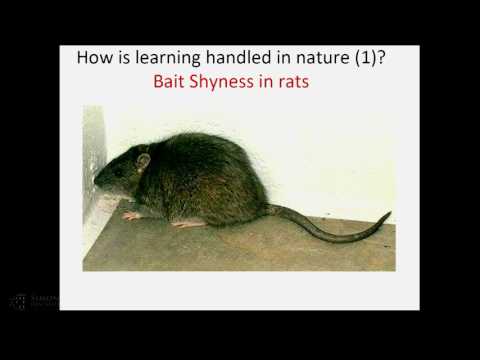 56:04 Machine Learning Today and Tomorrow: A Panel Discussion Panelists: Peter Bartlett (UC Berkeley; chair), Shai Ben-David (University of Waterloo), Amin Karbasi (Yale University), Andreas Krause (ETH Zurich)
56:04 Machine Learning Today and Tomorrow: A Panel Discussion Panelists: Peter Bartlett (UC Berkeley; chair), Shai Ben-David (University of Waterloo), Amin Karbasi (Yale University), Andreas Krause (ETH Zurich)
Machine learning has been crucial in developing...
 1:00:50 True Complexity of Multilinear Systems Freddie Manners, Stanford University
1:00:50 True Complexity of Multilinear Systems Freddie Manners, Stanford University
https://simons.berkeley.edu/talks/freddie-manners-2017-4-14
Structure vs. Randomness
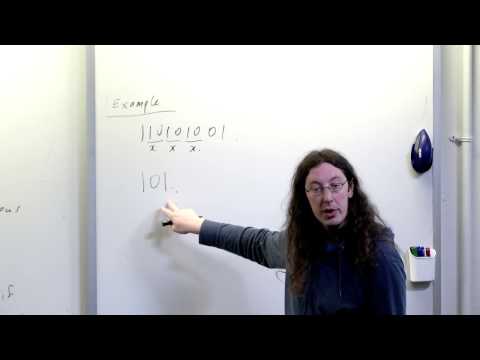 57:05 Unavoidable Patterns in Words David Conlon, University of Oxford
57:05 Unavoidable Patterns in Words David Conlon, University of Oxford
https://simons.berkeley.edu/talks/david-conlon-2017-4-14
Structure vs. Randomness
 58:07 Labeling the Complete Bipartite Graph with No Zero Cycles Shachar Lovett, UC San Diego
58:07 Labeling the Complete Bipartite Graph with No Zero Cycles Shachar Lovett, UC San Diego
https://simons.berkeley.edu/talks/shachar-lovett-2017-4-13
Structure vs. Randomness
 1:02:09 Positional Games and Randomness Michael Krivelevich, Tel Aviv University
1:02:09 Positional Games and Randomness Michael Krivelevich, Tel Aviv University
https://simons.berkeley.edu/talks/michael-krivelevich-201...
Structure vs. Randomness
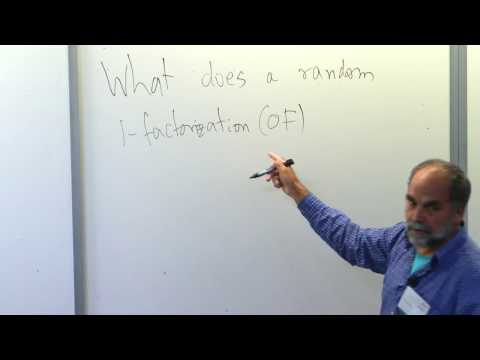 1:04:52 Random High-Dimensional Combinatorial Objects Nati Linial, Hebrew University of Jerusalem
1:04:52 Random High-Dimensional Combinatorial Objects Nati Linial, Hebrew University of Jerusalem
https://simons.berkeley.edu/talks/nati-linial-2017-4-12
Structure vs. Randomness
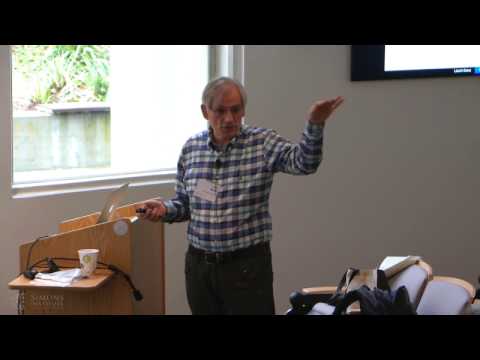 44:26 Hidden Irregularity Versus Hidden Structure: The Emergence of the Johnson Graphs Laszlo Babai, University of Chicago
44:26 Hidden Irregularity Versus Hidden Structure: The Emergence of the Johnson Graphs Laszlo Babai, University of Chicago
Structure vs. Randomness
https://simons.berkeley.edu/talks/laszlo-babai-2017-4-12-2
 1:06:48 Hidden Irregularity Versus Hidden Structure: The Emergence of the Johnson Graphs Laszlo Babai, University of Chicago
1:06:48 Hidden Irregularity Versus Hidden Structure: The Emergence of the Johnson Graphs Laszlo Babai, University of Chicago
https://simons.berkeley.edu/talks/laszlo-babai-2017-4-12-1
Structure vs. Randomness
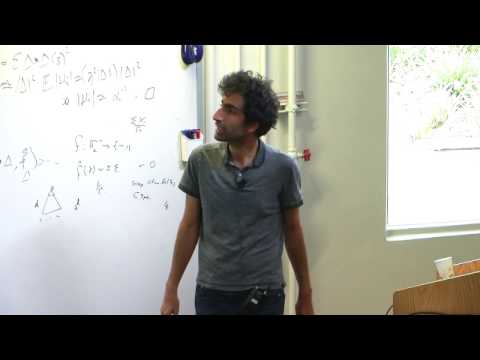 35:01 On Structural Properties of Low Threshold Rank Graphs Shayan Oveis-Gharan, University of Washington
35:01 On Structural Properties of Low Threshold Rank Graphs Shayan Oveis-Gharan, University of Washington
https://simons.berkeley.edu/talks/shayan-oveis-gharan-201...
Structure vs. Randomness
 1:02:35 Additive Structure of Sets of Fourier Coefficients Thomas Bloom, University of Bristol
1:02:35 Additive Structure of Sets of Fourier Coefficients Thomas Bloom, University of Bristol
https://simons.berkeley.edu/talks/tom-bloom-2017-4-11
Structure vs. Randomness
 1:01:44 Vinogradov's Three Primes Theorem with Primes from Special Sets Kaisa Matomäki, University of Turku
1:01:44 Vinogradov's Three Primes Theorem with Primes from Special Sets Kaisa Matomäki, University of Turku
https://simons.berkeley.edu/talks/kaisa-matomaki-2017-4-11
Structure vs. Randomness
 57:37 The Entropy Decrement Method and the Erdos Discrepancy Problem Terry Tao, UCLA
57:37 The Entropy Decrement Method and the Erdos Discrepancy Problem Terry Tao, UCLA
https://simons.berkeley.edu/talks/terry-tao-2017-4-11
Structure vs. Randomness
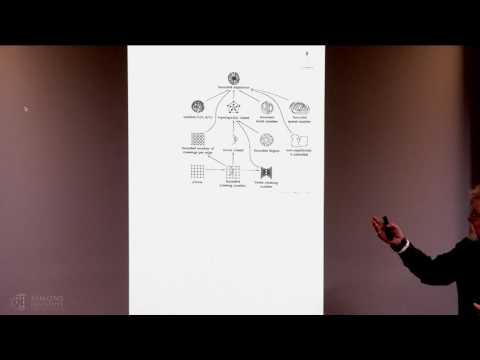 25:39 Sparse Dense Dichotomy and Liquid Graphs Jarik Nesetril, Charles University
25:39 Sparse Dense Dichotomy and Liquid Graphs Jarik Nesetril, Charles University
Structure vs. Randomness
https://simons.berkeley.edu/talks/jarik-nesetril-2017-4-10
 29:05 Trading Information Complexity for Error Hamed Hatami, McGill University
29:05 Trading Information Complexity for Error Hamed Hatami, McGill University
Structure vs. Randomness
https://simons.berkeley.edu/talks/hamed-hatami-2017-4-10
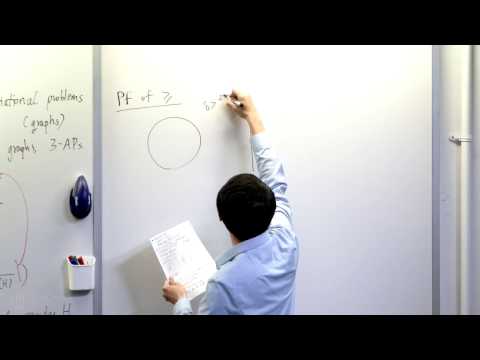 58:51 Large Deviations for Arithmetic Progressions Yufei Zhao, University of Oxford
58:51 Large Deviations for Arithmetic Progressions Yufei Zhao, University of Oxford
Structure vs. Randomness
https://simons.berkeley.edu/talks/yufei-zhao-2017-4-10
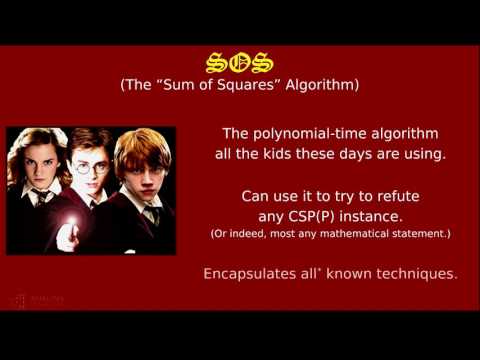 30:31 Sum of Squares Lower Bounds for Refuting Any CSP Ryan O'Donnell, Carnegie Mellon University
30:31 Sum of Squares Lower Bounds for Refuting Any CSP Ryan O'Donnell, Carnegie Mellon University
https://simons.berkeley.edu/talks/ryan-odonnell-2017-4-10
Structure vs. Randomness
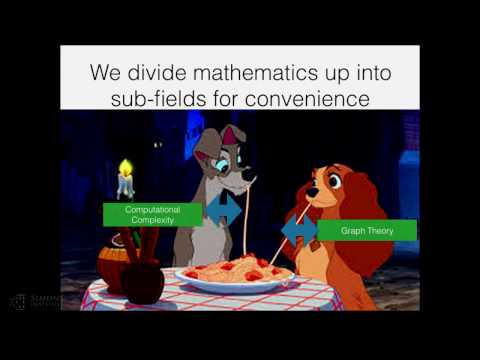 34:13 Algorithmic Dense Model Theorems and Weak Regularity Russell Impagliazzo, UC San Diego
34:13 Algorithmic Dense Model Theorems and Weak Regularity Russell Impagliazzo, UC San Diego
https://simons.berkeley.edu/talks/russell-impagliazzo-201...
Structure vs. Randomness
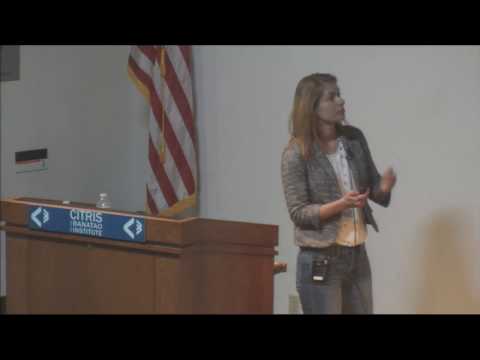 51:05 In Pursuit of Structure: Why a Little Randomness (Almost) Always Helps Julia Wolf (University of Bristol)
51:05 In Pursuit of Structure: Why a Little Randomness (Almost) Always Helps Julia Wolf (University of Bristol)
https://simons.berkeley.edu/events/openlectures2017-spring-3
Simons Institute Open Lecture
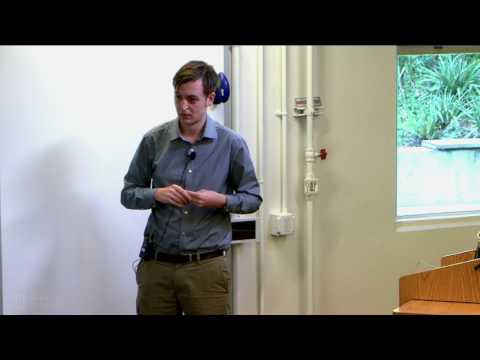 20:15 Spotlght Talk: Performance Guarantees for Transferring Representations Daniel McNamara, Australian National University
20:15 Spotlght Talk: Performance Guarantees for Transferring Representations Daniel McNamara, Australian National University
Representation Learning
https://simons.berkeley.edu/talks/daniel-mcnamara-2017-03-31
 47:18 Word Representation Learning without unk Assumptions Chris Dyer, Carnegie Mellon University
47:18 Word Representation Learning without unk Assumptions Chris Dyer, Carnegie Mellon University
Representation Learning
https://simons.berkeley.edu/talks/chris-dyer-2017-3-31
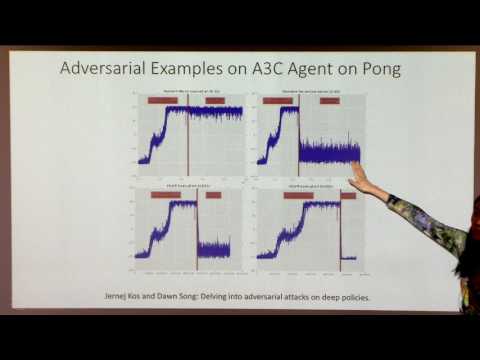 42:18 Resilient Representation and Provable Generalization Dawn Song, UC Berkeley
42:18 Resilient Representation and Provable Generalization Dawn Song, UC Berkeley
Representation Learning
https://simons.berkeley.edu/talks/dawn-song-2017-03-31
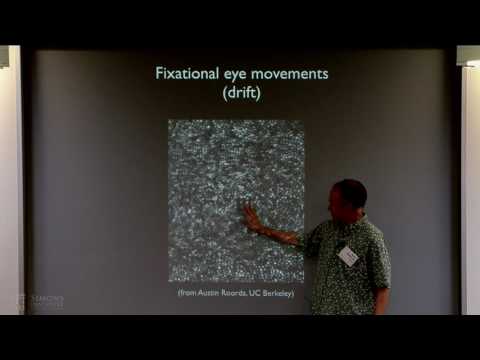 1:06:38 Learning Representations for Active Vision Bruno Olshausen, UC Berkeley
1:06:38 Learning Representations for Active Vision Bruno Olshausen, UC Berkeley
Representation Learning
https://simons.berkeley.edu/talks/bruno-olshausen-2017-3-31
 43:17 Formation and Association of Symbolic Memories in the Brain Christos Papadimitriou, UC Berkeley
43:17 Formation and Association of Symbolic Memories in the Brain Christos Papadimitriou, UC Berkeley
Representation Learning
https://simons.berkeley.edu/talks/christos-papadimitriou-...
 39:44 Learning Paraphrastic Representations of Natural Language Sentences Kevin Gimpel, TTI Chicago
39:44 Learning Paraphrastic Representations of Natural Language Sentences Kevin Gimpel, TTI Chicago
Representation Learning
https://simons.berkeley.edu/talks/kevin-gimpel-2017-3-31
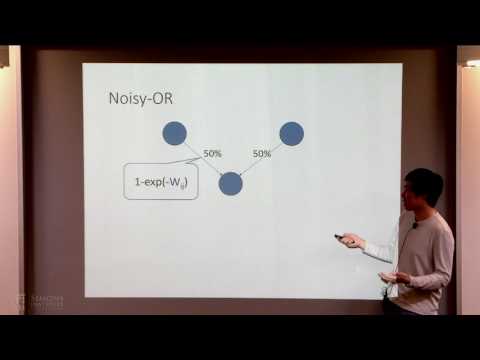 41:32 Provably Learning of Noisy-or Networks Rong Ge, Duke University
41:32 Provably Learning of Noisy-or Networks Rong Ge, Duke University
Representation Learning
https://simons.berkeley.edu/talks/rong-ge-2017-3-30
 1:09:16 Unsupervised Representation Learning Yann LeCun, New York University
1:09:16 Unsupervised Representation Learning Yann LeCun, New York University
Representation Learning
https://simons.berkeley.edu/talks/yann-lecun-2017-3-30
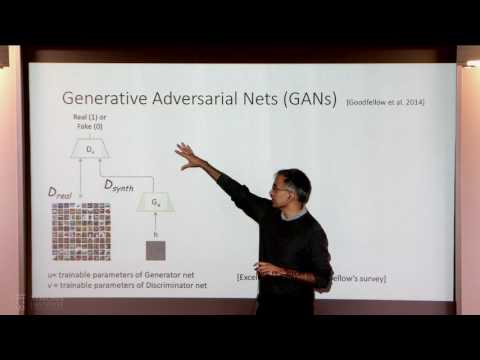 43:28 Generalization and Equilibrium in Generative Adversarial Nets (GANs) Sanjeev Arora, Princeton University
43:28 Generalization and Equilibrium in Generative Adversarial Nets (GANs) Sanjeev Arora, Princeton University
Representation Learning
https://simons.berkeley.edu/talks/sanjeev-arora-2017-3-30
 42:44 Representation Learning of Grounded Language and Knowledge: with and without End-to-End Learning Yejin Choi, University of Washington
42:44 Representation Learning of Grounded Language and Knowledge: with and without End-to-End Learning Yejin Choi, University of Washington
Representation Learning
https://simons.berkeley.edu/talks/yejin-choi-2017-3-30
 41:54 Re-Thinking Representational Learning in Robotics and Music Sham Kakade, University of Washington
41:54 Re-Thinking Representational Learning in Robotics and Music Sham Kakade, University of Washington
Representation Learning
https://simons.berkeley.edu/talks/sham-kakad
 1:05:48 How the Web Has Transformed Science and Technology Reporting John Markoff, Simons Institute Journalist in Residence
1:05:48 How the Web Has Transformed Science and Technology Reporting John Markoff, Simons Institute Journalist in Residenceand Christoph Drösser, independent science writer and editor
https://simons.berkeley.edu/events/ho
 56:04 Machine Learning Today and Tomorrow: A Panel Discussion Panelists: Peter Bartlett (UC Berkeley; chair), Shai Ben-David (University of Waterloo), Amin Karbasi (Yale University), Andreas Krause (ETH Zurich)
56:04 Machine Learning Today and Tomorrow: A Panel Discussion Panelists: Peter Bartlett (UC Berkeley; chair), Shai Ben-David (University of Waterloo), Amin Karbasi (Yale University), Andreas Krause (ETH Zurich)Machine learning has been crucial in developing...
 1:00:50 True Complexity of Multilinear Systems Freddie Manners, Stanford University
1:00:50 True Complexity of Multilinear Systems Freddie Manners, Stanford Universityhttps://simons.berkeley.edu/talks/freddie-manners-2017-4-14
Structure vs. Randomness
 57:05 Unavoidable Patterns in Words David Conlon, University of Oxford
57:05 Unavoidable Patterns in Words David Conlon, University of Oxfordhttps://simons.berkeley.edu/talks/david-conlon-2017-4-14
Structure vs. Randomness
 58:07 Labeling the Complete Bipartite Graph with No Zero Cycles Shachar Lovett, UC San Diego
58:07 Labeling the Complete Bipartite Graph with No Zero Cycles Shachar Lovett, UC San Diegohttps://simons.berkeley.edu/talks/shachar-lovett-2017-4-13
Structure vs. Randomness
 1:02:09 Positional Games and Randomness Michael Krivelevich, Tel Aviv University
1:02:09 Positional Games and Randomness Michael Krivelevich, Tel Aviv Universityhttps://simons.berkeley.edu/talks/michael-krivelevich-201...
Structure vs. Randomness
 1:04:52 Random High-Dimensional Combinatorial Objects Nati Linial, Hebrew University of Jerusalem
1:04:52 Random High-Dimensional Combinatorial Objects Nati Linial, Hebrew University of Jerusalemhttps://simons.berkeley.edu/talks/nati-linial-2017-4-12
Structure vs. Randomness
 44:26 Hidden Irregularity Versus Hidden Structure: The Emergence of the Johnson Graphs Laszlo Babai, University of Chicago
44:26 Hidden Irregularity Versus Hidden Structure: The Emergence of the Johnson Graphs Laszlo Babai, University of ChicagoStructure vs. Randomness
https://simons.berkeley.edu/talks/laszlo-babai-2017-4-12-2
 1:06:48 Hidden Irregularity Versus Hidden Structure: The Emergence of the Johnson Graphs Laszlo Babai, University of Chicago
1:06:48 Hidden Irregularity Versus Hidden Structure: The Emergence of the Johnson Graphs Laszlo Babai, University of Chicagohttps://simons.berkeley.edu/talks/laszlo-babai-2017-4-12-1
Structure vs. Randomness
 35:01 On Structural Properties of Low Threshold Rank Graphs Shayan Oveis-Gharan, University of Washington
35:01 On Structural Properties of Low Threshold Rank Graphs Shayan Oveis-Gharan, University of Washingtonhttps://simons.berkeley.edu/talks/shayan-oveis-gharan-201...
Structure vs. Randomness
 1:02:35 Additive Structure of Sets of Fourier Coefficients Thomas Bloom, University of Bristol
1:02:35 Additive Structure of Sets of Fourier Coefficients Thomas Bloom, University of Bristolhttps://simons.berkeley.edu/talks/tom-bloom-2017-4-11
Structure vs. Randomness
 1:01:44 Vinogradov's Three Primes Theorem with Primes from Special Sets Kaisa Matomäki, University of Turku
1:01:44 Vinogradov's Three Primes Theorem with Primes from Special Sets Kaisa Matomäki, University of Turkuhttps://simons.berkeley.edu/talks/kaisa-matomaki-2017-4-11
Structure vs. Randomness
 57:37 The Entropy Decrement Method and the Erdos Discrepancy Problem Terry Tao, UCLA
57:37 The Entropy Decrement Method and the Erdos Discrepancy Problem Terry Tao, UCLAhttps://simons.berkeley.edu/talks/terry-tao-2017-4-11
Structure vs. Randomness
 25:39 Sparse Dense Dichotomy and Liquid Graphs Jarik Nesetril, Charles University
25:39 Sparse Dense Dichotomy and Liquid Graphs Jarik Nesetril, Charles UniversityStructure vs. Randomness
https://simons.berkeley.edu/talks/jarik-nesetril-2017-4-10
 29:05 Trading Information Complexity for Error Hamed Hatami, McGill University
29:05 Trading Information Complexity for Error Hamed Hatami, McGill UniversityStructure vs. Randomness
https://simons.berkeley.edu/talks/hamed-hatami-2017-4-10
 58:51 Large Deviations for Arithmetic Progressions Yufei Zhao, University of Oxford
58:51 Large Deviations for Arithmetic Progressions Yufei Zhao, University of OxfordStructure vs. Randomness
https://simons.berkeley.edu/talks/yufei-zhao-2017-4-10
 30:31 Sum of Squares Lower Bounds for Refuting Any CSP Ryan O'Donnell, Carnegie Mellon University
30:31 Sum of Squares Lower Bounds for Refuting Any CSP Ryan O'Donnell, Carnegie Mellon Universityhttps://simons.berkeley.edu/talks/ryan-odonnell-2017-4-10
Structure vs. Randomness
 34:13 Algorithmic Dense Model Theorems and Weak Regularity Russell Impagliazzo, UC San Diego
34:13 Algorithmic Dense Model Theorems and Weak Regularity Russell Impagliazzo, UC San Diegohttps://simons.berkeley.edu/talks/russell-impagliazzo-201...
Structure vs. Randomness
 51:05 In Pursuit of Structure: Why a Little Randomness (Almost) Always Helps Julia Wolf (University of Bristol)
51:05 In Pursuit of Structure: Why a Little Randomness (Almost) Always Helps Julia Wolf (University of Bristol)https://simons.berkeley.edu/events/openlectures2017-spring-3
Simons Institute Open Lecture
 20:15 Spotlght Talk: Performance Guarantees for Transferring Representations Daniel McNamara, Australian National University
20:15 Spotlght Talk: Performance Guarantees for Transferring Representations Daniel McNamara, Australian National UniversityRepresentation Learning
https://simons.berkeley.edu/talks/daniel-mcnamara-2017-03-31
 47:18 Word Representation Learning without unk Assumptions Chris Dyer, Carnegie Mellon University
47:18 Word Representation Learning without unk Assumptions Chris Dyer, Carnegie Mellon UniversityRepresentation Learning
https://simons.berkeley.edu/talks/chris-dyer-2017-3-31
 42:18 Resilient Representation and Provable Generalization Dawn Song, UC Berkeley
42:18 Resilient Representation and Provable Generalization Dawn Song, UC BerkeleyRepresentation Learning
https://simons.berkeley.edu/talks/dawn-song-2017-03-31
 1:06:38 Learning Representations for Active Vision Bruno Olshausen, UC Berkeley
1:06:38 Learning Representations for Active Vision Bruno Olshausen, UC BerkeleyRepresentation Learning
https://simons.berkeley.edu/talks/bruno-olshausen-2017-3-31
 43:17 Formation and Association of Symbolic Memories in the Brain Christos Papadimitriou, UC Berkeley
43:17 Formation and Association of Symbolic Memories in the Brain Christos Papadimitriou, UC BerkeleyRepresentation Learning
https://simons.berkeley.edu/talks/christos-papadimitriou-...
 39:44 Learning Paraphrastic Representations of Natural Language Sentences Kevin Gimpel, TTI Chicago
39:44 Learning Paraphrastic Representations of Natural Language Sentences Kevin Gimpel, TTI ChicagoRepresentation Learning
https://simons.berkeley.edu/talks/kevin-gimpel-2017-3-31
 41:32 Provably Learning of Noisy-or Networks Rong Ge, Duke University
41:32 Provably Learning of Noisy-or Networks Rong Ge, Duke UniversityRepresentation Learning
https://simons.berkeley.edu/talks/rong-ge-2017-3-30
 1:09:16 Unsupervised Representation Learning Yann LeCun, New York University
1:09:16 Unsupervised Representation Learning Yann LeCun, New York UniversityRepresentation Learning
https://simons.berkeley.edu/talks/yann-lecun-2017-3-30
 43:28 Generalization and Equilibrium in Generative Adversarial Nets (GANs) Sanjeev Arora, Princeton University
43:28 Generalization and Equilibrium in Generative Adversarial Nets (GANs) Sanjeev Arora, Princeton UniversityRepresentation Learning
https://simons.berkeley.edu/talks/sanjeev-arora-2017-3-30
 42:44 Representation Learning of Grounded Language and Knowledge: with and without End-to-End Learning Yejin Choi, University of Washington
42:44 Representation Learning of Grounded Language and Knowledge: with and without End-to-End Learning Yejin Choi, University of WashingtonRepresentation Learning
https://simons.berkeley.edu/talks/yejin-choi-2017-3-30
 41:54 Re-Thinking Representational Learning in Robotics and Music Sham Kakade, University of Washington
41:54 Re-Thinking Representational Learning in Robotics and Music Sham Kakade, University of WashingtonRepresentation Learning
https://simons.berkeley.edu/talks/sham-kakad
Psychology of Gender by Herb Agan (U of Houston)
# playlist of the 18 videos (click the upper-left icon of the video)
source: UHouston 2013年2月21日
PSYC 3331
Title: Psychology of Gender
Professor: Herb Agan
Description: The goal of this course is to explore the psychology of gender through an understanding of biological and archetypal dimensions of Female/Male, Feminine/Masculine and contra-sexuality as a basis for gender differences, social behaviors, roles and public policies. Emphasis will focus on empirical evidence from our text and gender manifestations in the collective unconscious through ancient myths. Practical aspects toward better communication and more authentic relationships will underlie our study.
source: UHouston 2013年2月21日
PSYC 3331
Title: Psychology of Gender
Professor: Herb Agan
Description: The goal of this course is to explore the psychology of gender through an understanding of biological and archetypal dimensions of Female/Male, Feminine/Masculine and contra-sexuality as a basis for gender differences, social behaviors, roles and public policies. Emphasis will focus on empirical evidence from our text and gender manifestations in the collective unconscious through ancient myths. Practical aspects toward better communication and more authentic relationships will underlie our study.
Psychology of Personality by Edward Sheridan (U of Houston)
# playlist of the 36 videos (click the upper-left icon of the video)
source: UHouston 2010年8月18日
PSYC 3325
Title: Psychology of Personality
Professor: Edward Sheridan
Description: Theories of personality and their applications to current individual and societal psychological problems.
source: UHouston 2010年8月18日
PSYC 3325
Title: Psychology of Personality
Professor: Edward Sheridan
Description: Theories of personality and their applications to current individual and societal psychological problems.
(اردو / in Urdu) Bioinformatics I (Essentials of Genome Informatics) [VU of Pakistan]
# playlist of the 162 videos (click the upper-left icon of the video)
source: vu 2015年9月10日
BIF733 - Bioinformatics I (Essentials of Genome Informatics)
source: vu 2015年9月10日
BIF733 - Bioinformatics I (Essentials of Genome Informatics)
(اردو / in Urdu) Advanced Bioinformatics (VU of Pakistan)
# playlist of the 200 videos (click the upper-left icon of the video)
source: vu 2015年5月25日
BIF731 - Advanced Bioinformatics
source: vu 2015年5月25日
BIF731 - Advanced Bioinformatics
(اردو / in Urdu) General Science (Physics, Chemistry and Biology) [VU of Pakistan]
# playlist of the 45 videos (click the upper-left icon of the video)
source: vu 2012年3月21日
GSC101 General Science
(Physics, Chemistry and Biology)
source: vu 2012年3月21日
GSC101 General Science
(Physics, Chemistry and Biology)
(اردو / in Urdu) Molecular Biology (VU of Pakistan)
# playlist of the 70 videos (click the upper-left icon of the video)
source: vu 2015年11月2日
BIO302 - Molecular Biology
source: vu 2015年11月2日
BIO302 - Molecular Biology
Integrability in Holography
# click the upper-left icon to select videos from the playlist
source: LeonhardEuler1 2014年8月26日
Talks from the "Integrability in Holography" workshop held at Banff in June of 2014. The conference website, where the videos can be downloaded, can be found here: http://www.birs.ca/events/2014/5-day-workshops/14w5070/vi...
Martin Kruczenski, Wilson Loops and Minimal Area Surfaces in Hyperbolic Space 1:11:30
Jon Toledo, The Plateau Problem In AdS 1:12:04
Alexander Zhiboedov, Causality Constraints on Corrections to the Graviton Three Point Coupling 1:21:56
Vladimer Kazakov, Quantum Spectral Curve and Q-system for N=4 SYM 1:21:54
João Caetano, Three Point Functions in su(1|1) Sector of N=4 SYM at Weak Coupling 1:07:09
Grigory Sizov, Exact Slope and Interpolating Functions in ABJM Theory 1:16:37
source: LeonhardEuler1 2014年8月26日
Talks from the "Integrability in Holography" workshop held at Banff in June of 2014. The conference website, where the videos can be downloaded, can be found here: http://www.birs.ca/events/2014/5-day-workshops/14w5070/vi...
Martin Kruczenski, Wilson Loops and Minimal Area Surfaces in Hyperbolic Space 1:11:30
Jon Toledo, The Plateau Problem In AdS 1:12:04
Alexander Zhiboedov, Causality Constraints on Corrections to the Graviton Three Point Coupling 1:21:56
Vladimer Kazakov, Quantum Spectral Curve and Q-system for N=4 SYM 1:21:54
João Caetano, Three Point Functions in su(1|1) Sector of N=4 SYM at Weak Coupling 1:07:09
Grigory Sizov, Exact Slope and Interpolating Functions in ABJM Theory 1:16:37
Holography and Applied String Theory
# click the upper-left icon to select videos from the playlist
source: LeonhardEuler1 2014年8月25日
Talks from the "Holography and Applied String Theory" workshop held at Banff in February of 2013. The conference website, where the videos can be downloaded, can be found here: http://www.birs.ca/events/2013/5-day-workshops/13w5054/vi...
Sean Hartnoll, Transport Without Quasiparticles 29:36
Gordon Semenoff, Holographic Quantum Hall States 31:11
Nick Evans, Simple Holography of the Conformal Window 30:40
Jan Zaanen, Holography and the Emergence of the Fermi Liquid 35:43
Koenrad Schalm, Strongly Coupled Electron Systems from Holography: (Quantum) Birth of AdS Stars 30:11
Andreas Karch, Diffeomorphism Invariance and Non relativistic Holography 35:43
Nabil Iqbal, Friedel Oscillations and Horizon Charge in 1D Holographic Liquids 36:48
Makoto Natsuume, Enhanced Holographic Superconductors? 32:01
Amos Yarom, Anomalies and Hydrodynamics 32:31
Moshe Rozali, Compressible Matter at a Holographic Interface 36:40
Kristan Jensen, Anomaly Inflow and Exact Results at T0 35:02
Marios Petropoulos, Vortices, Cotton Tensor, and Ergodicity from a Holographic Perspective 39:01
Martin Ammon, Properties of Cold Holographic Matter Compressible States in Probe Brane Systems 35:02
Jerome Gauntlett, Superfluids, Stripes, and Metamagnetism in M-theory 28:59
Julian Sonner, Dynamics of Broken Symmetry 34:52
Christopher Herzog, Entanglement Entropy and Temperature 32:07
Elias Kiritsis, The Quantum Critical Landscape of Einstein Maxwell Dialation Theories 31:48
Matthias Kaminski, Hyperscaling Violation on Probe D-Branes 36:35
Carlo Ewerz, Holography for Strongly Coupled Plasmas 32:12
Xi Dong, Resolution of Lifshitz Singularities 31:47
Johanna Erdmenger, Aspects of Universality in Gauge/Gravity Duality 37:47
source: LeonhardEuler1 2014年8月25日
Talks from the "Holography and Applied String Theory" workshop held at Banff in February of 2013. The conference website, where the videos can be downloaded, can be found here: http://www.birs.ca/events/2013/5-day-workshops/13w5054/vi...
Sean Hartnoll, Transport Without Quasiparticles 29:36
Gordon Semenoff, Holographic Quantum Hall States 31:11
Nick Evans, Simple Holography of the Conformal Window 30:40
Jan Zaanen, Holography and the Emergence of the Fermi Liquid 35:43
Koenrad Schalm, Strongly Coupled Electron Systems from Holography: (Quantum) Birth of AdS Stars 30:11
Andreas Karch, Diffeomorphism Invariance and Non relativistic Holography 35:43
Nabil Iqbal, Friedel Oscillations and Horizon Charge in 1D Holographic Liquids 36:48
Makoto Natsuume, Enhanced Holographic Superconductors? 32:01
Amos Yarom, Anomalies and Hydrodynamics 32:31
Moshe Rozali, Compressible Matter at a Holographic Interface 36:40
Kristan Jensen, Anomaly Inflow and Exact Results at T0 35:02
Marios Petropoulos, Vortices, Cotton Tensor, and Ergodicity from a Holographic Perspective 39:01
Martin Ammon, Properties of Cold Holographic Matter Compressible States in Probe Brane Systems 35:02
Jerome Gauntlett, Superfluids, Stripes, and Metamagnetism in M-theory 28:59
Julian Sonner, Dynamics of Broken Symmetry 34:52
Christopher Herzog, Entanglement Entropy and Temperature 32:07
Elias Kiritsis, The Quantum Critical Landscape of Einstein Maxwell Dialation Theories 31:48
Matthias Kaminski, Hyperscaling Violation on Probe D-Branes 36:35
Carlo Ewerz, Holography for Strongly Coupled Plasmas 32:12
Xi Dong, Resolution of Lifshitz Singularities 31:47
Johanna Erdmenger, Aspects of Universality in Gauge/Gravity Duality 37:47
Refined Invariants in Geometry, Topology, and String Theory
# click the upper-left icon to select videos from the playlist
source: LeonhardEuler1 2014年8月22日
Talks from the "Refined Invariants in Geometry, Topology, and String Theory" workshop held at Banff in June of 2013. The conference website, where the videos can be downloaded, can be found here: http://www.birs.ca/events/2013/5-day-workshops/13w5134/vi...
Andrei Okounkov, M-theory and DT-theory I 1:10:17
Sheldon Katz, Equivariant Stable Pair Invariants and Refined BPS Indices 1:05:24
Dominic Joyce, Categorification of Donaldson–Thomas Theory Using Perverse Sheaves 59:59
Zheng Hua, Spin Structure on Moduli Space of Sheaves on CY 3-folds 1:03:13
Sven Meinhardt, Motivic DT-invariants of 2-curves 30:51
Andrei Okounkov, M-theory and DT-theory II 54:46
Vivek Shende, Legendrian Knots and Constructible Sheaves 1:07:33
Anatoly Preygel, Higher Structures on Hochschild Invariants of Matrix Factorizations 1:05:50
Andrew Morrison, Asymptotics of 3D Partitions and Refined Invariants 37:53
Alexei Oblomkov, Topology of Planar Curves, Knot Homology and Representation Theory of Cherednik 1:00:59
Luca Migliorini, Support Theorems for Hilbert Schemes of Families of Planar Curves 1:02:57
Ezra Getzler, Derived Stacks 1:04:24
Emmanuel Letellier, Counting of Geometrically Indecomposable.... 1:04:12
Ben Davison, Purity of Critical Cohomology for Graded Potentials and Quantum Cluster Positivity 1:11:55
Vittoria Bussi, On Motivic Vanishing Cycles of Critical Loci 1:01:06
Duiliu Emanuel Diaconescu, Parabolic Refined Invariants and Macdonald Polynomials 1:07:45
Andras Szenes, Equivariant Intersection Theory of Higgs Moduli Spaces 1:11:22
Kai Behrend, Categorification of Lagrangian Intersections via Deformation Quantization 1:11:25
Lotte Hollands, Surface Defects and the Superconformal Index 1:11:47
Vincent Bouchard, Mirror Symmetry for Orbifold Hurwitz Numbers 1:01:16
Dusty Ross, The Gerby Gopakumar–Marino–Vafa Formula 32:26
source: LeonhardEuler1 2014年8月22日
Talks from the "Refined Invariants in Geometry, Topology, and String Theory" workshop held at Banff in June of 2013. The conference website, where the videos can be downloaded, can be found here: http://www.birs.ca/events/2013/5-day-workshops/13w5134/vi...
Andrei Okounkov, M-theory and DT-theory I 1:10:17
Sheldon Katz, Equivariant Stable Pair Invariants and Refined BPS Indices 1:05:24
Dominic Joyce, Categorification of Donaldson–Thomas Theory Using Perverse Sheaves 59:59
Zheng Hua, Spin Structure on Moduli Space of Sheaves on CY 3-folds 1:03:13
Sven Meinhardt, Motivic DT-invariants of 2-curves 30:51
Andrei Okounkov, M-theory and DT-theory II 54:46
Vivek Shende, Legendrian Knots and Constructible Sheaves 1:07:33
Anatoly Preygel, Higher Structures on Hochschild Invariants of Matrix Factorizations 1:05:50
Andrew Morrison, Asymptotics of 3D Partitions and Refined Invariants 37:53
Alexei Oblomkov, Topology of Planar Curves, Knot Homology and Representation Theory of Cherednik 1:00:59
Luca Migliorini, Support Theorems for Hilbert Schemes of Families of Planar Curves 1:02:57
Ezra Getzler, Derived Stacks 1:04:24
Emmanuel Letellier, Counting of Geometrically Indecomposable.... 1:04:12
Ben Davison, Purity of Critical Cohomology for Graded Potentials and Quantum Cluster Positivity 1:11:55
Vittoria Bussi, On Motivic Vanishing Cycles of Critical Loci 1:01:06
Duiliu Emanuel Diaconescu, Parabolic Refined Invariants and Macdonald Polynomials 1:07:45
Andras Szenes, Equivariant Intersection Theory of Higgs Moduli Spaces 1:11:22
Kai Behrend, Categorification of Lagrangian Intersections via Deformation Quantization 1:11:25
Lotte Hollands, Surface Defects and the Superconformal Index 1:11:47
Vincent Bouchard, Mirror Symmetry for Orbifold Hurwitz Numbers 1:01:16
Dusty Ross, The Gerby Gopakumar–Marino–Vafa Formula 32:26
Subscribe to:
Comments (Atom)